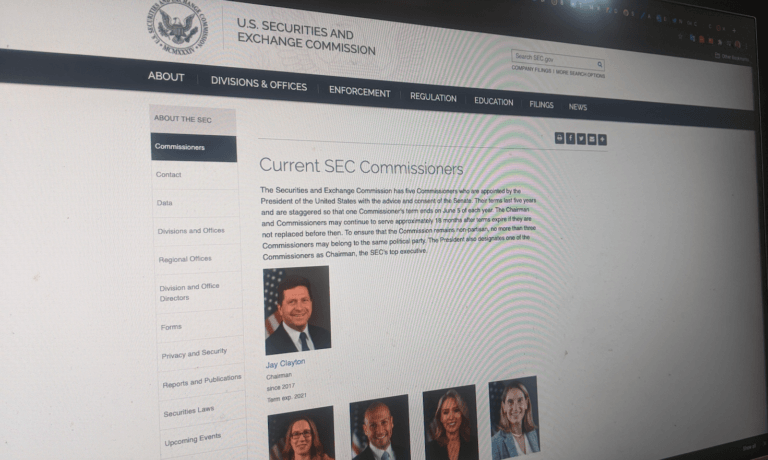On Monday (September 14), MicroStrategy Inc. told the U.S. Securities and Exchange Commission (SEC) although it disclosed a $250 investment in Bitcoin on August 11, it may be adding to its BTC holdings in the future.
On August 11, Nasdaq-listed business intelligence company MicroStrategy Inc. announced via a press release that it had “purchased 21,454 bitcoins at an aggregate purchase price of $250 million” to use as a “primary treasury reserve asset.”
Michael J. Saylor, CEO of MicroStrategy Inc., said at the time:
“This investment reflects our belief that Bitcoin, as the world’s most widely-adopted cryptocurrency, is a dependable store of value and an attractive investment asset with more long-term appreciation potential than holding cash.
“Since its inception over a decade ago, Bitcoin has emerged as a significant addition to the global financial system, with characteristics that are useful to both individuals and institutions.
“MicroStrategy has recognized Bitcoin as a legitimate investment asset that can be superior to cash and accordingly has made Bitcoin the principal holding in its treasury reserve strategy.”
Saylor went on to say:
“Our decision to invest in Bitcoin at this time was driven in part by a confluence of macro factors affecting the economic and business landscape that we believe is creating long-term risks for our corporate treasury program ― risks that should be addressed proactively.
“Those macro factors include, among other things, the economic and public health crisis precipitated by COVID-19, unprecedented government financial stimulus measures including quantitative easing adopted around the world, and global political and economic uncertainty.
“We believe that, together, these and other factors may well have a significant depreciating effect on the long-term real value of fiat currencies and many other conventional asset types, including many of the assets traditionally held as part of corporate treasury operations.”
Yesterday (September 14), MicroStrategy disclosed by filing a “Form 8-K“—which, according to Investopedia, is “a report of unscheduled material events or corporate changes at a company that could be of importance to the shareholders or the Securities and Exchange Commission”—that it had adopted a new Treasury Reserve Policy, as the result of which its Bitcoin holdings “may increase beyond the $250 million investment that the Company disclosed on August 11, 2020.”
Here is the relevant passage from item 8.01 (“Other Events”) of its Form 8-K:
“On September 11, 2020, the Board of Directors (the ‘Board’) of MicroStrategy Incorporated (the ‘Company’) adopted a new Treasury Reserve Policy (the ‘Policy’) that updated the Company’s treasury management and capital allocation strategies.
“Under the new Policy, treasury reserve assets will consist of (i) cash, cash equivalents, and short-term investments (‘Cash Assets’) held by the Company that exceed working capital needs and (ii) bitcoin held by the Company, with bitcoin serving as the primary treasury reserve asset on an ongoing basis, subject to market conditions and anticipated needs of the business for Cash Assets, including future potential share repurchase activity.
“As a result of this new Policy, the Company’s holdings of bitcoin may increase beyond the $250 million investment that the Company disclosed on August 11, 2020.”
One company that was influenced last month by MicroStrategy’s decision to invest in Bitcoin for use as the primary treasury reserve was Canadian startup Snappa.
On August 24, Christopher Gimmer, Co-Founder and CEO of Snappa, explained the reasoning behind his company’s decision to use Bitcoin as a reserve asset.
In his blog post, Gimmer said that with the current extremely low interest rate that is available for U.S. dollar or Canadian dollar savings account, they realized that the purchasing power of their fiat savings “is actually decreasing after adjusting for inflation.”
So they started “steadily accumulating bitcoin beginning in March of this year,” and currently this position is “a significant percentage” of Snappa’s “overall cash reserves.”
Snappa did consider using gold as a reserve asset, but after studying the paper “The Bullish Case for Bitcoin” by Vijay Boyapati, they decided that Bitcoin is a superior store of value and that Bitcoin will “continue to outperform gold over the coming years and decades.”
Gimmer said that the reason he is so concerned about “maintaining purchasing power” for his company’s savings is today’s macro environment:
“While there’s plenty of debate whether or not QE leads to CPI inflation (which is a flawed metric in my opinion), it seems pretty clear that QE has led to asset price inflation.
“In addition, due to the wealth inequality that continues to widen as a result of these policies, there are mounting cries for more permanent forms of universal basic income (UBI) which would certainly lead to CPI inflation.”
Gimmer went on to say:
“To summarize, we’re now at a point where parking dollars in a savings account or buying short-term government debt is yielding a negative return when adjusted for inflation.”
The Snappa CEO then mentioned that although some might consider Bitcoin a risky asset, “there are now significant risks to holding fiat currencies especially over long durations.”
Update at 13:42 UTC on September 15:
Roughly one hour ago, the MicroStrategy CEO tweeted that his company had bought another 16,796 bitcoins on September 14:
Update #2 at 14:05 UTC on September 15
This is what the CEO of Digital Currency Group (DCG), the world’s largest digit asset manager and the parent of Grayscale Investments, had to say about MicroStrategy’s latest Bitcoin purchase:
The views and opinions expressed by the author are for informational purposes only and do not constitute financial, investment, or other advice.









